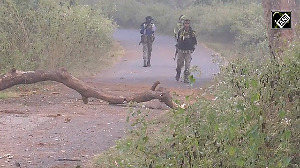Bank customers, beware. The taxman again is on the prowl. He is fishing for information from banks on an array of transactions and has halved the eligibility criterion for "roving and fishing enquiries" from Rs 100,000 to Rs 50,000.
In an attempt to widen the tax base and unearth black money, the income-tax department has directed all banks to furnish before August 25, 2003, information on customer transactions exceeding Rs 50,000 in 2002-03.
It wants them to furnish information on time deposits exceeding Rs 50,000, bank draft purchases of more than Rs 50,000 in cash, deposits of more than Rs 50,000 in any one day, foreign exchange worth Rs 25,000 and above bought by any person and bank finance for purchase of vehicles other than two-wheelers.
This comes even as the Central Board of Direct Taxes issued "instructions" to income-tax officials in 2000 saying they should seek information only on cash transactions of Rs 100,000 and above and assets declared for loans or overdrafts of Rs 50 lakh (Rs 5 million) and above.
Section 13 of the Banking Companies (Acquisition) Act, 1970, requires banks to maintain confidentiality about their customers, except where otherwise required by the law.
The income-tax department is calling for general information on bank customers under Section 133(6) of the Income Tax Act, 1961, to find out whether the invested funds come from explained sources of income.
Bank executives gripe that the move will put pressure on them. "As it is banks have operational difficulties in submitting information about cash transactions of Rs 100,000 and above. This exerts tremendous pressure on bank branches as such transactions are large in numbers. With the lowering of the bar on reporting transactions, the banks' woes will only multiply," said a senior banker.
Banks feel that enquiries under Section 133 (6) should be restricted to cash transactions of Rs 10 lakh (Rs 1 million) and above and data on assets offered against loans or overdrafts of Rs 50 lakh and above. They can submit details about cash transactions of Rs 10 lakh and above without any additional workload at the branches as a reporting system already exists for such transactions.
Moreover, under Section 139A, every person is required to quote his Permanent Account Number or General Index Number, or make a declaration in Form 60 for specified transactions like opening bank accounts for the purchase of bank draft of more than Rs 50,000 in cash, deposits of more than Rs 50,000 in cash in any one day and so on.





 © 2025 Rediff.com -
© 2025 Rediff.com -